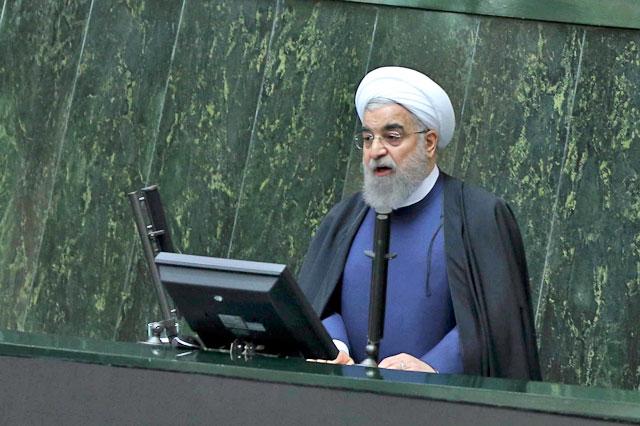You are here
Iran sanctions renewal becomes law without Obama signature
By AP - Dec 15,2016 - Last updated at Dec 15,2016
WASHINGTON — In an unexpected reversal, President Barack Obama declined to sign a renewal of sanctions against Iran but let it become law anyway, in an apparent bid to alleviate Tehran's concerns that the US is backsliding on the nuclear deal.
Although the White House had said that Obama was expected to sign the 10-year-renewal, the midnight deadline came and went Thursday with no approval from the president. Instead, he opted to let it become law without his signature — a rare move that Obama has never used before.
White House spokesman Josh Earnest said the president's decision was intended to send a direct message to lawmakers who passed the sanctions renewal over his objections.
"If Congress does blow up the deal that prevents Iran from getting a nuclear weapon, they're going to have to deal with the consequences, and the consequences are grave," Earnest said. He emphasised that the Obama administration can and will continue to waive the sanctions that were lifted as part of the nuclear deal.
Under the constitution, the president has 10 days after Congress passes a bill to sign it, veto it or do nothing. If Congress has adjourned, failing to sign it is a "pocket veto" that prevents the bill from becoming law. But if Congress is still in session, the bill becomes law with no signature. Although lawmakers have returned home for the holidays, Congress technically is still in session and holding "pro-forma" sessions this week.
Though Obama's move doesn't prevent the sanctions renewal from taking effect, it marked a symbolic attempt to distance the president from lawmakers' fresh slap at Tehran.
The White House has argued that the renewal is unnecessary because the administration retains other authorities to punish Iran, if necessary, and has expressed concern that the renewal may undermine the nuclear deal.
Iran had vowed to respond if the sanctions were renewed, arguing they violate the nuclear deal between Iran and world powers, which eased sanctions in exchange for curbs on Iran’s nuclear programme. Iran’s government has complained to the United Nations about the renewal, and on Tuesday, Iran’s president ordered up plans to build nuclear-powered ships and to formally accuse the US of violating the terms of the deal.
Yet US lawmakers argued that renewing the law, first passed in 1996 and renewed several times since, was critical to maintaining pressure on Iran to abide by the deal and to pushing back on Tehran’s other troubling behaviour in the region. The bill passed the Senate unanimously and the House by an overwhelming margin.
“Don’t be fooled by Tehran’s rhetoric. Iran is the only party that has broken terms of the deal,” said House Foreign Affairs Committee Chairman Ed Royce, R-Calif. He said the law “ensures the Trump administration can ‘snap-back’ other powerful sanctions when the ayatollah makes a rush for a nuclear weapon.”
The Obama administration stressed that Iran would be unaffected by the renewal, as long as it continues honouring the nuclear deal. Secretary of State John Kerry said he’d told his Iranian counterpart that “to ensure maximum clarity,” he’d issued new, redundant waivers exempting Iran from sanctions lifted under the deal.
“Extension of the Iran Sanctions Act does not affect in any way the scope of the sanctions relief Iran is receiving under the deal or the ability of companies to do business in Iran consistent with the JCPOA,” Kerry said, using an acronym for the nuclear deal.
President-elect Donald Trump has been sharply critical of the nuclear deal and has threatened to try to renegotiate it, and Israel’s prime minister has said he plans to lobby Trump to undo the deal. Republican supporters of the sanctions had argued that renewing them would ensure that Trump would have the authority to reinstate penalties that Obama eased.
Under the nuclear deal, the US and world powers suspended sweeping oil, trade and other financial sanctions that had devastated Iran’s economy. In exchange, Tehran agreed to roll back its nuclear programme, though the deal’s critics say the agreement is flawed because it didn’t halt all Iranian activity and because key restrictions eventually expire.
Related Articles
DUBAI — Iranian President Hassan Rouhani demanded on Sunday that Barack Obama block an extension of sanctions passed by the US Congress, say
President Barack Obama appears to have prevailed, for now, in a campaign to stop Congress from passing new sanctions on Iran he fears could derail nuclear diplomacy.
WASHINGTON — President Barack Obama marked the anniversary of the landmark nuclear deal with Iran on Thursday by vowing that the United Stat



















